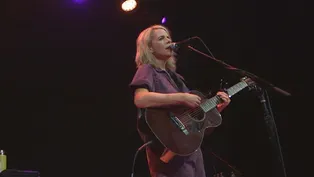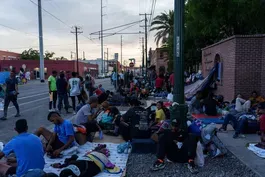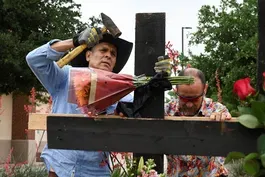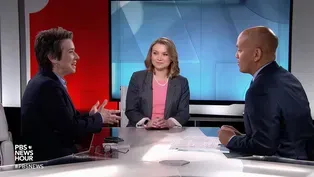
Many try to flee Haiti as gangs terrorize innocent civilians
Clip: 5/8/2023 | 9m 21sVideo has Closed Captions
Thousands try to flee Haiti as gangs terrorize innocent civilians
The U.N. Security Council expressed deep concern over the security and humanitarian crises in Haiti. The Caribbean nation is in freefall without effective governance or protection from gangs that routinely terrorize innocent civilians with kidnappings, sexual abuse and murder. That has left people reeling from the violence and determined to leave. Special correspondent Marcia Biggs reports.
Problems with Closed Captions? Closed Captioning Feedback
Problems with Closed Captions? Closed Captioning Feedback
Major corporate funding for the PBS News Hour is provided by BDO, BNSF, Consumer Cellular, American Cruise Lines, and Raymond James. Funding for the PBS NewsHour Weekend is provided by...

Many try to flee Haiti as gangs terrorize innocent civilians
Clip: 5/8/2023 | 9m 21sVideo has Closed Captions
The U.N. Security Council expressed deep concern over the security and humanitarian crises in Haiti. The Caribbean nation is in freefall without effective governance or protection from gangs that routinely terrorize innocent civilians with kidnappings, sexual abuse and murder. That has left people reeling from the violence and determined to leave. Special correspondent Marcia Biggs reports.
Problems with Closed Captions? Closed Captioning Feedback
How to Watch PBS News Hour
PBS News Hour is available to stream on pbs.org and the free PBS App, available on iPhone, Apple TV, Android TV, Android smartphones, Amazon Fire TV, Amazon Fire Tablet, Roku, Samsung Smart TV, and Vizio.
Providing Support for PBS.org
Learn Moreabout PBS online sponsorshipGEOFF BENNETT: The U.N. Security Council today expressed what it called deep concern over the security and humanitarian crises in Haiti.
The Caribbean nation is in freefall, without effective governance or protection from gangs that routinely terrorize innocent civilians.
That has left people reeling from the violence and others hopeless, determined to leave.
Special correspondent Marcia Biggs reports from the capital of Haiti, Port-au-Prince.
MARCIA BIGGS: It is a scene of utter chaos, this passport office in Port-au-Prince overrun with patients desperate to make it to the United States.
Demands for new passports have reportedly gone from 1,500 a day to more than 5,000 since the launch of a U.S. visa program that the Biden administration is calling humanitarian parole.
You need a valid passport just to begin that application process.
Twenty-year-old Ange-Mery has been camped out there waiting her turn for three weeks.
She says she doesn't want to betray her country, but she cannot stay.
ANGE-MERY MOISE, Port-au-Prince Resident (through translator): Every day, the gang territory is expanding.
They take some more every day, we can't live like that.
MARCIA BIGGS: Can you tell me where you are sleeping?
ANGE-MERY MOISE (through translator): Right in front of me there.
MARCIA BIGGS: Is it scary to be here, sleeping here at night?
ANGE-MERY MOISE (through translator): Yes.
I'm afraid to sleep here because there is gunfire, and you don't know where it is from.
You never know when you are going to be the victim.
MARCIA BIGGS: Victim to a wave of gang violence that has Haiti gripped with terror.
Hundreds of thousands have fled, and now remaining residents are taking matters into their own hands.
Two weeks ago, an angry mob beat and then burned alive more than a dozen suspected gang members.
It's fear and frustration born of a long-running economic and humanitarian crisis that worsened in July 2021, when President Jovenel Moise was assassinated.
Interim Prime Minister Ariel Henry didn't keep his promise to hold elections, and Haitian politics have since then fallen apart.
Now criminal gangs have flourished where official authorities no longer govern.
Port-au-Prince is a city held hostage by gangs.
We were just talking to some people here on the street about the situation.
And they were terrified to speak.
They said: "If I speak today, I will be dead tomorrow."
But, for women, the weapon of retribution is often rape.
The U.N. estimates almost one-third of women and girls in Haiti have been the victims of sexual abuse or violence; 20-year-old Sousphanie has been on her own since her mother died last August.
Her only family is her son, 17 month-old Ainslie.
His father is a man she had been involved with since she was 12 years old.
But she says she never knew he was in a gang.
We have hidden her face for her own safety.
SOUSPHANIE, Victim of Gang Violence (through translator): The owner of the house where I rented a room told me that he didn't like when those type of people come to his house.
At that time, I didn't believe him 100 percent.
It's later when I went to sell downtown and I saw him with a bunch of guys with machine guns, that is when I finally totally believed it that he was in a gang.
That night, I told him not to ever come back.
MARCIA BIGGS: But he did come back with six of his friends.
SOUSPHANIE (through translator): The minute they came in the house, they started beating me up.
Some beat me with a wooden board.
Some beat me with a gun.
And some beat me with electrical wires.
They asked me, how come I wouldn't get back together with him?
Where did I get that rebellious spirit?
Then they raped me.
When they finished doing what they were doing, they threw the baby at me and pushed me outside.
MARCIA BIGGS: They through your baby at you?
Was the baby hurt?
Was the baby crying?
SOUSPHANIE (through translator): Yes, he was crying.
And his leg was injured.
MARCIA BIGGS: What's going through your mind right now?
SOUSPHANIE (through translator): Every time I tell this story, it's like if I felt it again.
It's like I relived it again.
That is what is in my head right now.
MARCIA BIGGS: I'm so sorry.
SOUSPHANIE (through translator): I was ashamed.
I didn't feel like a human being anymore.
I didn't want to go out.
Even people who didn't knew what I had endured, I couldn't look them into their eyes.
MARCIA BIGGS: For three months, she was homeless.
She says, if it were not for her son, she would have killed herself, but then, recently, a beacon of hope.
A local women's shelter unites her with other victims and a psychologist, which she says has helped with the shame.
But she still worries that Ainslie's father and his friends will come looking for her again.
Can you go to the police?
Or is there anything that you can do to make - - to feel safer?
SOUSPHANIE (through translator): I didn't go to the police because the policemen cannot protect themselves, so they cannot protect me.
GARRY PIERRE-PIERRE, Founder, The Haitian Times: This is where we are right now.
The police are no match for the gangs.
MARCIA BIGGS: Garry Pierre-Pierre is the founder of The Haitian Times, an English-language publication that covers the island nation.
GARRY PIERRE-PIERRE: About 30 percent to 40 percent of the police force are either sympathizers or downright members of these gangs.
The police missions have become suicide missions because the gangs are waiting and laying and waiting for them.
MARCIA BIGGS: The U.N. has called for the deployment of an international force, but the problem runs much deeper, Pierre-Pierre says.
GARRY PIERRE-PIERRE: What happens next?
How do you integrate the gang members into civil society and get them to jobs and really dismantle the gangs?
Because, at the end of the day, it's a socioeconomic problem that we have that's creating this.
MARCIA BIGGS: In the meantime, residents living in areas of intense fighting are all but abandoned.
It's just too risky to go in and out, including for us.
But we were able to make the trip with Jose Ulysse, who manages a hospital in one of those neighborhoods.
So, we are on our way to the Fontaine Hospital, which is the last remaining, last standing hospital in Cite Soleil, one of the most violent areas in all of Port-au-Prince.
We are here with a fully armored vehicle because we have to cross several front lines to get there.
We held our breath on this last part of the journey as, just down that road, lies what's called the Death Crossroads.
But once we reached the hospital, an oasis of sorts from the fear.
Mothers bring their babies for vaccinations and hospital staff does everything from teaching vocational skills to treating gunshot wounds.
Ulysse says he has been able to stay open because the majority of the staff are from the community and because they keep no records or alert police when they treat injuries of gang violence.
JOSE ULYSSE (Director, Fontaine Hospital): We don't need to know where you come from, why you are here, no.
We don't have questions.
No questions asked.
You have a bullet in your leg, we remove it.
We give you medicine and go away.
MARCIA BIGGS: Today, there are no gunshot victims, but, rather, the daily medical procedures vital in any community.
This woman is having a C-section.
Anxious relatives wait in the hallway for their loved ones.
Where would you go if this hospital didn't exist?
MARIE-MARTHE FRANCOIS, Cite Soleil Resident (through translator): We would perish.
We would die because it's the only hospital that is left.
Cite Soleil is now an area that is abandoned.
You walk in the street, you are afraid.
You get to your home, you are afraid.
Everywhere, we are afraid.
We don't live in peace.
MARCIA BIGGS: But the hospital is a safe haven for even the tiniest patients.
Haiti has the highest infant mortality rate of any country in the Western Hemisphere.
Babies are often born at home or in the street because a trip to the hospital just is not safe, like this baby.
She was born last night, delivered at home with an infected umbilical cord, which, untreated, could lead to sepsis and then death.
Her mother, 17-year-old Rose-Bianca, got her to the hospital, even though she says she is scared even to walk in the streets.
ROSE-BIANCA BARTHELMY, Cite Soleil Resident (through translator): I am really afraid because of how things are right now, bullets flying in the air from everywhere, and you can't know exactly where it came from.
I have to take the street with lots of caution nowadays.
MARCIA BIGGS: Are you scared for the baby?
ROSE-BIANCA BARTHELMY (through translator): Yes, I am scared for her a lot.
MARCIA BIGGS: At our final stop in the hospital, we walked into a room full of little ones.
Sick and malnourished when they arrived, most were abandoned when their parents were killed or could no longer care for them.
Now thriving, we asked how long they could stay.
"They can stay forever," we are told.
"They are home."
As we were about to leave, we noticed Rose-Bianca cradling her baby girl less than 24 hours old.
She had been discharged and was negotiating for a ride home on a motorbike.
Carefully, she and her sister climb on the back and ride off with her newborn baby into an unknown future.
For the "PBS NewsHour," I am Marcia Biggs in Port-au-Prince, Haiti.
Aoife O'Donovan takes on Springsteen's 'Nebraska'
Video has Closed Captions
Clip: 5/8/2023 | 6m 46s | Singer-songwriter Aoife O'Donovan takes on Springsteen's 'Nebraska' on latest tour (6m 46s)
Closing arguments made in civil case against Trump
Video has Closed Captions
Clip: 5/8/2023 | 6m 30s | Closing arguments made in sexual assault civil case against Trump (6m 30s)
El Paso mayor on surge of migrants in the city
Video has Closed Captions
Clip: 5/8/2023 | 7m 13s | El Paso mayor on surge of migrants in the city as COVID-era immigration order expires (7m 13s)
A look at the rise of the AR-15 in America
Video has Closed Captions
Clip: 5/8/2023 | 8m 38s | A look at the rise of the AR-15 in America after 8 killed at Texas outlet mall (8m 38s)
Tamara Keith and Amy Walter on end of Title 42, debt debate
Video has Closed Captions
Clip: 5/8/2023 | 10m 26s | Tamara Keith and Amy Walter on end of Title 42 border policy and debt ceiling showdown (10m 26s)
Providing Support for PBS.org
Learn Moreabout PBS online sponsorshipSupport for PBS provided by:
Major corporate funding for the PBS News Hour is provided by BDO, BNSF, Consumer Cellular, American Cruise Lines, and Raymond James. Funding for the PBS NewsHour Weekend is provided by...
















